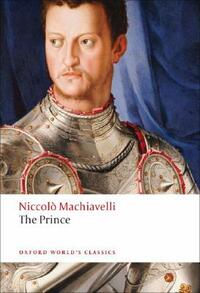Take a photo of a barcode or cover
I admit this book wasn't at all what I expected. One in a line of many books I've often read about or read "summaries" of, I decided to finally read it mostly because of my current, video-game-inspired interest in the Italy of the Renaissance. As silly as it may sound, I really did think this was a bad, as in evil, book teaching people how to be a tyrant.
And while it is a guidebook for aspiring leaders, and contains many sentences that leave one feeling uncomfortable or thinking, "But that's not how it should be" it helps if you keep in mind that this is not a book about how people should be like, but about how people are and about what that means for anyone who wants to gain - and keep - power. Sure, it would be nice if no one ever lied or betrayed anybody, but as the man himself writes, "People are a sad lot". A lot of what he writes is shocking even today - after all, while you know that most politicians lie and cheat, it's another thing to see someone recommend that behavior. It's not about what's wrong or right, it's about what works and what doesn't. It's a no-nonsense approach, and Machiavelli's writing is very concise, which I appreciated.
Whenever I'm reading a book translated from a language that isn't English, I have the choice between a German and an English translation. I chose this one because I'd read several reviews about it and it sounded like the most modern - the German translation I looked at in comparison seemed a little "dusty". And really, this didn't read like a 500 year old book. I also have to say that I love the design of the Penguin Deluxe Classics; they look extremely pretty and are a lot more readable than other English paperbacks.
[As an aside that doesn't have all that much to do with the book but everything with why I ended up reading it: the more I end up reading about that time period the more impressed I am with Assassin's Creed 2. And Brotherhood also plays wonderfully with the misconceptions one may have about Machiavelli. Really, really cool.]
And while it is a guidebook for aspiring leaders, and contains many sentences that leave one feeling uncomfortable or thinking, "But that's not how it should be" it helps if you keep in mind that this is not a book about how people should be like, but about how people are and about what that means for anyone who wants to gain - and keep - power. Sure, it would be nice if no one ever lied or betrayed anybody, but as the man himself writes, "People are a sad lot". A lot of what he writes is shocking even today - after all, while you know that most politicians lie and cheat, it's another thing to see someone recommend that behavior. It's not about what's wrong or right, it's about what works and what doesn't. It's a no-nonsense approach, and Machiavelli's writing is very concise, which I appreciated.
Whenever I'm reading a book translated from a language that isn't English, I have the choice between a German and an English translation. I chose this one because I'd read several reviews about it and it sounded like the most modern - the German translation I looked at in comparison seemed a little "dusty". And really, this didn't read like a 500 year old book. I also have to say that I love the design of the Penguin Deluxe Classics; they look extremely pretty and are a lot more readable than other English paperbacks.
[As an aside that doesn't have all that much to do with the book but everything with why I ended up reading it: the more I end up reading about that time period the more impressed I am with Assassin's Creed 2. And Brotherhood also plays wonderfully with the misconceptions one may have about Machiavelli. Really, really cool.]
dark
informative
reflective
slow-paced
Part suggestions, part observations, wholly perhaps job application, as usual a fascinating read. On the whole I swing to the idea that Machiavelli was very conscious of the contingency in all political (and military activities). It is also interesting (I don't recall noticing before) that he sees the 1% in today's terms as antagonistic to the commones and intent on working against their interests. No change there then.
While I will be the first to admit that sometimes I got lost in the historical intricacy, the genereal ideas outlined in the book are excellent and interesting.
Turns out, the ends do justify the means... Or do they?
The Prince is an interesting book, but one based on a generally pessimistic view of human nature. I knew that going in, but I have to say, I was still disappointed by how oversimplified and undetailed it is. Machiavelli is obviously famous for being a little...uh...Machiavellian, but there don't seem to be many other dimensions to it.
I can only conclude that The Prince gained fame (or perhaps infamy) more because of the author's willingness to say what was considered too reprehensible or embarrassing to admit, rather than for its style or utility.
I can only conclude that The Prince gained fame (or perhaps infamy) more because of the author's willingness to say what was considered too reprehensible or embarrassing to admit, rather than for its style or utility.
informative
slow-paced
Read it just out of curiosity to understand what exactly comes under the catch-all adjective 'Machiavellian'. Understood that quite a few of them in power have been practising some of his ideas in different forms without perhaps ever hearing about him.

